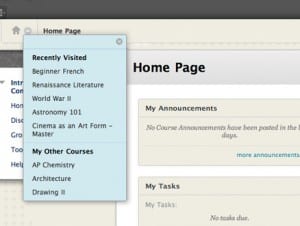Here’s a little more from Wednesday’s Midlands Blackboard User Group meeting. As always, Blackboard representatives were present at the meeting to tell us all about their plans for the future, and this proved an interesting session. As a company they have always had a strategy of absorbing, or partnering with other tools, but I was quite surprised to hear that they are talking about integrating with Pebble Pad, which I’ve always felt was the best of the various e-portfolio tools available. My surprise arises from the fact that Pebble pad is a product that has always had a completely different look and feel from Blackboard, although I haven’t seen the latest versions as yet. Colleagues from other institutions tell me they’re very impressive though. They also mentioned a potential partnership with a company called Kaltura, who offer a video management tool which has apparently enjoyed some success in HE.

On to more mundane matters, we were told about the upcoming service packs. Service packs are not new versions of the software, but are either enhancements to the existing functionality of the software, or fixes for the enhancements that didn’t quite work in the previous version. The latest such pack is, according to Blackboard, the first one to be wholly based on customer feedback, and offers a number of significant improvements to the user interface. Most importantly they have finally got rid of the module boxes on the front page in this pack, replacing them with a menu that appears when you roll your cursor over the word “courses”. There’s a “recently visited” list of modules too. Instructors can change colour schemes within modules, although there is a limited range of schemes. Finally they have introduced what they call course relationships – this simply means that it is possible to arrange menus hierarchically, so for example, you could show modules as part of a programme.
In terms of assessment, they have introduced negative and weighted marking into the on-line quizzes. Although there’s some debate about this, my own feeling is that the ability to penalise students for guessing makes a multiple choice test a much more powerful assessment tool. There’s also a regrade the whole test feature. Previously, if an instructor made an error and indicated an incorrect answer as correct, then they had to regrade each students attempt. Now this can be done in a single operation.
The final enhancement in the latest service pack is what is called “standards alignment” It is possible to align course and even specific learning outcomes with sets of standards, and you can also find content that is associated with particular standards, a feature that looks as though it may be particularly useful in course validations, as we’ll be able to test how any proposed module meets the strategic requirements of the university (In theory. Of course, it would be necessary to convert those requirements into standards first)
For techies, Out of box shibboleth and CAS authentication will be provided and it is now possible to use whatever version of Apache you want. Finally, “Blackboard Analytics” will be released in June, which offers very detailed statistical reporting, although this is a new product, not part of a service pack.
This last paragraph looks at medium term plans, although the Blackboard representative did admit that most of this stuff was as yet, only half written. However it does sound quite exciting. Plans for later service packs (2013) include a much greater social presence for Blackboard, including a student learning space, where they can interact with friends (I detect the influence of Facebook here), Something else that is long overdue is a shareable learning object repository which will be added to the content store. They’ll also be upgrading the test canvas again, to make some of the question tools a little bit more user friendly. The survey tool will also be enhanced so that it will be possible to deploy surveys outside Blackboard, which may be of some interest to researchers. Analysis tools will be provided within Blackboard. Finally, and again something that should have been done years ago, it sounds as though it will be possible to integrate the Blackboard Calendar with web based calendars (although they didn’t mention Outlook).
You must be logged in to post a comment.